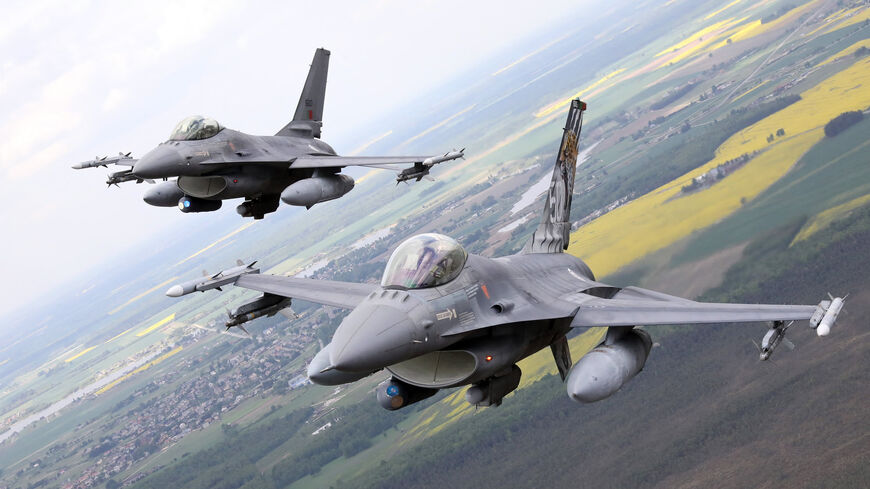US President Joe Biden spoke by phone with Turkey’s incumbent President Recep Tayyip Erdogan on Monday about Sweden’s bid to join the NATO alliance and Turkey’s request to overhaul its US-made fleet of F-16 fighter jets.
“I spoke to Erdogan. I congratulated Erdogan,” Biden told reporters at the White House before heading to his home state of Delaware.
“He still wants to work on something on the F-16s. I told him we wanted a deal with Sweden, so let’s get that done. And so we’ll be back in touch with one another,” Biden said.
Erdogan was reelected as Turkey’s president on Sunday over opposition candidate Kemal Kilicdaroglu, extending his leadership of the country into a third decade for a final five-year term in office as president.
Erdogan’s government has held up Sweden’s request to join the NATO alliance over demands that Stockholm extradite alleged “terrorists,” including dissident journalists and activists linked to left-wing Kurdish groups. Sweden’s parliament amended the country’s constitution late last year to strengthen its anti-terror laws in a bid to comply with Ankara’s demands.
Turkey has also requested the United States sell it $20 billion worth of new F-16s and 79 upgrade kits for its existing fleet. Turkey’s F-16s form the bulk of its combat aircraft after the United States expelled Ankara from the fifth-generation F-35 fighter jet program in 2019 over the Erdogan-led government’s decision to acquire Russian-made S-400 air defense systems.
Key lawmakers in Congress have opposed the sale, citing what they see as Erdogan’s aggressive foreign policy in the eastern Mediterranean and toward Syria’s Kurds, but there have been recent signs of potential compromise on Capitol Hill.
Congress has approved a much smaller $259 million sale of F-16 avionics software upgrades to Ankara in recent weeks. Rep. Michael McCaul, chair of the House Foreign Affairs Committee, said last week he is open to approving the larger $20 billion deal.
“We have been assured that after the election, regardless of the winner, that Sweden will be recognized as a NATO ally,” McCaul told Politico.
Turkey and Hungary remain the only two NATO members that have not ratified Stockholm’s bid to join the alliance, which was raised last year following Russia’s war of aggression against Ukraine.
Asked by a reporter on Monday whether he expected any progress from Turkey on Sweden’s accession bid, Biden replied, “I raised that issue with him. We’re going to talk about it more next week.”
Biden’s comments on Monday marked the first time the White House has explicitly linked the issue of Sweden’s NATO accession to Turkey’s desire to overhaul its F-16 fleet.
The administration has repeatedly denied the two issues are connected, though Turkey’s Foreign Minister Mevlut Cavusoglu said earlier this year that US officials have told Turkish counterparts that ending Turkey’s obstruction of Sweden’s bid to join NATO would grease the wheels of the F-16 sale in Congress. The US legislature has the power to block major sales of US weapons systems abroad.
US Secretary of State Antony Blinken reiterated on Tuesday that the Biden administration has not linked the two issues, saying however that some members of Congress have done so.
“Congress is a fully equal an independent branch of government,” Blinken said alongside Prime Minister Ulf Kristersson in Luleå, Sweden.
“Their voice and their vote in any such decisions, of course, is critical, but from our perspective, we believe that both should go forward and should go forward as quickly as possible,” he continued.
Earlier on Tuesday, the top US diplomat discussed Sweden’s accession bid among other issues with Cavusoglu by phone, Turkish media reported.
“We will continue to work to complete Sweden’s accession by the time our leaders gathered in Vilnius for the NATO Summit,” Blinken said alongside Kristersson.
The Secretary of State offered a conciliatory note on the impasse, saying it was “to Turkey’s credit that it’s been able to focus all of the alliance” on Ankara’s concerns about terrorism.
“It’s to Sweden’s credit, as well as [to] Finland’s credit, that they’ve taken concrete action to address those concerns,” Blinken added.
“We look forward to this process being completed in the weeks ahead. We have no doubt that it can be and it should be and we expect it to be.”
Turkey’s expulsion from the F-35 program has made its reliance on its F-16s all the more important. Erdogan’s government, which controls the second-largest standing armed forces in NATO, has objected as neighboring Greece, also a NATO member, has begun proceedings to join the F-35 consortium with Congress’ blessing.
During the call on Monday, Biden and Erdogan “expressed their shared commitment to continue working together as close partners to deepen cooperation,” the White House said in a readout.
“They also discussed their readiness as NATO allies to address regional and global challenges, including strengthening transatlantic security at the NATO summit in Vilnius,” which is scheduled for July 11-13.
“The two leaders noted that Turkey-US relations are of greater importance in face of regional and global challenges, agreeing to improve cooperation on all bilateral issues in the upcoming period,” the Turkish readout of the call read. Neither readout mentioned the F-16 sale proposal nor NATO accession.







